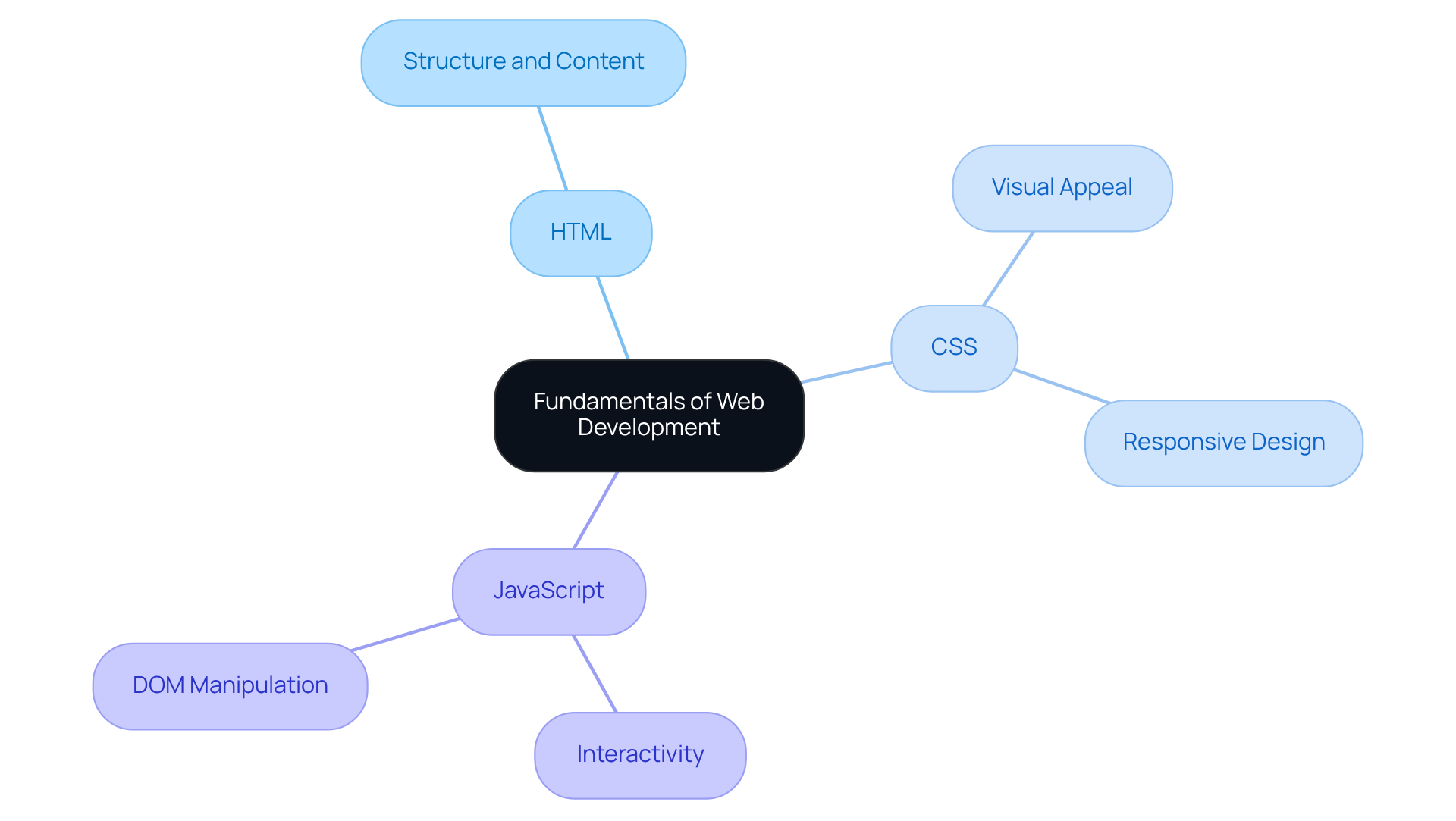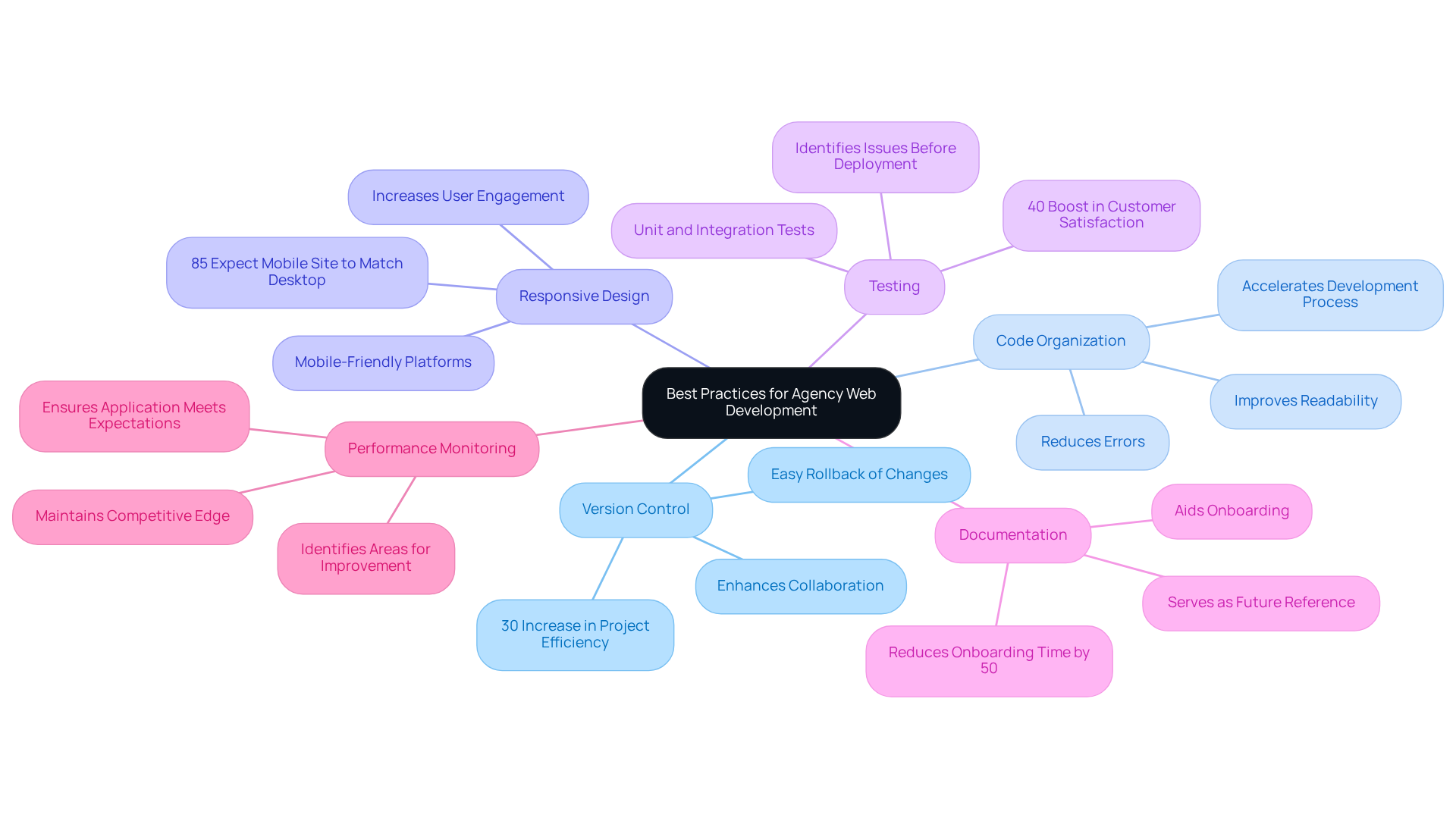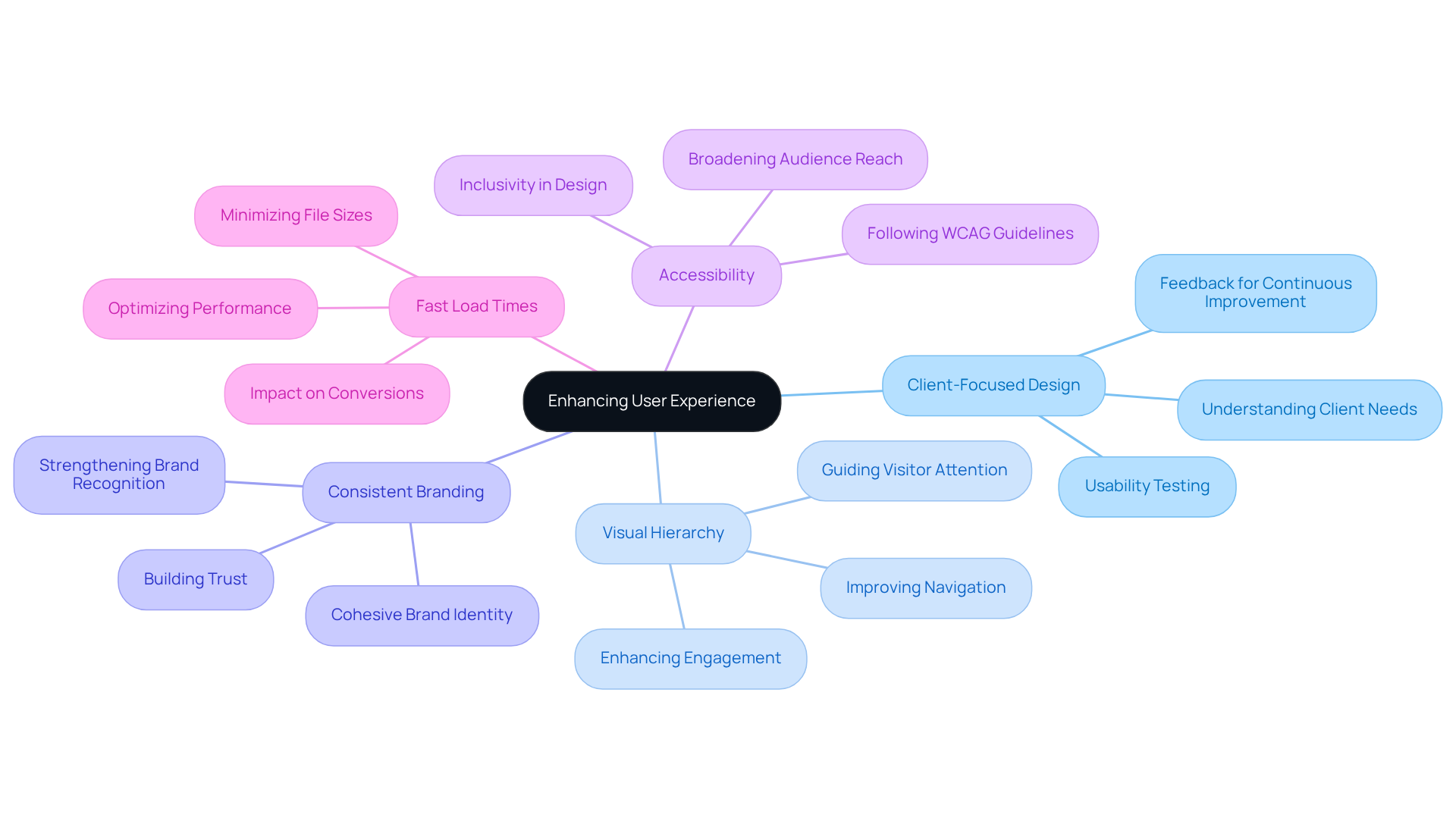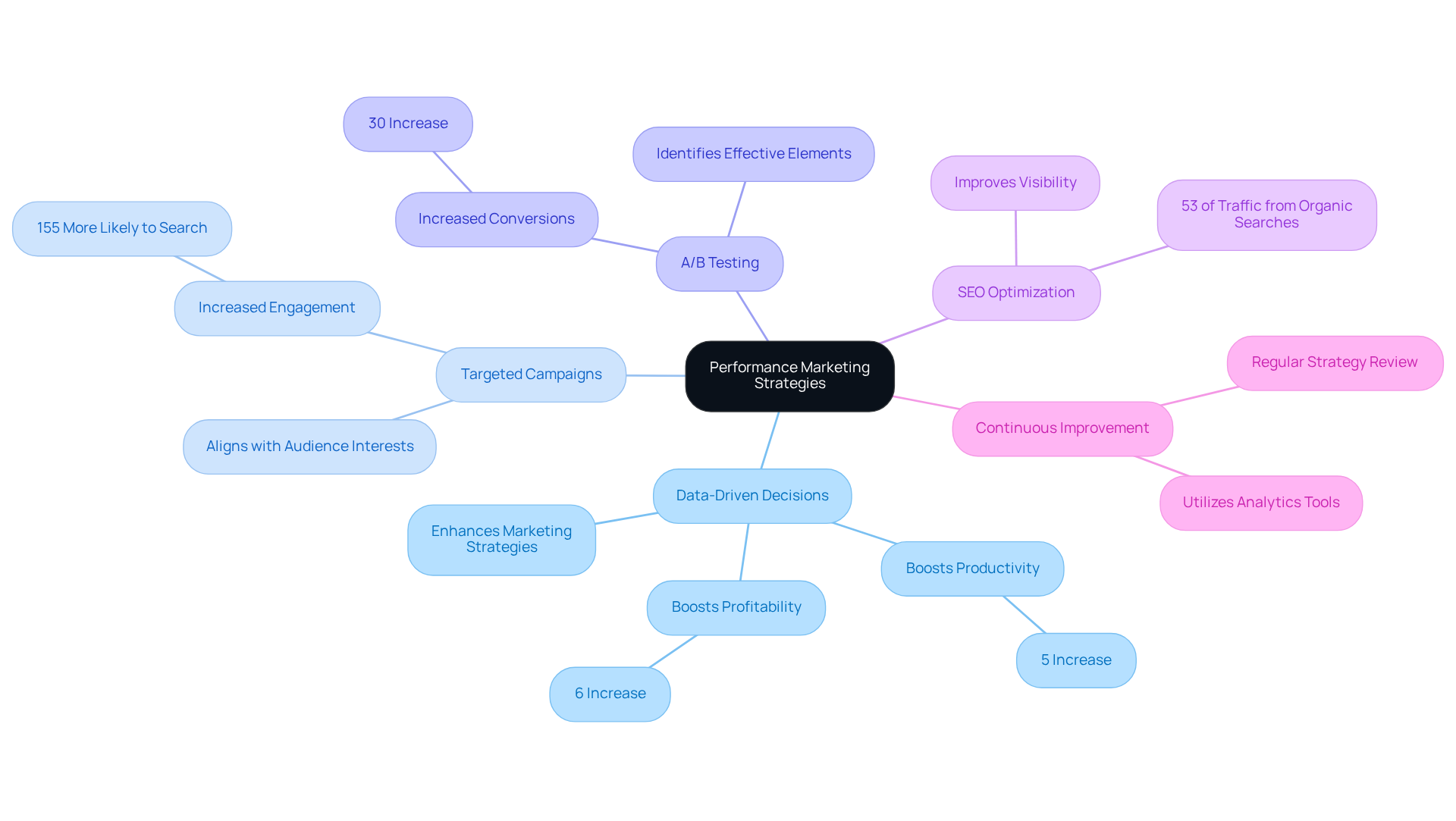Overview
In the journey of mastering web development, agencies often encounter significant challenges. The foundational skills in HTML, CSS, and JavaScript can feel daunting, especially when paired with the complexities of version control, responsive design, and user-centered strategies. These are not just technical skills; they are the building blocks that can either elevate an online platform or leave clients feeling unsatisfied. The pressure to create effective solutions that truly meet client needs can be overwhelming.
But you are not alone in this struggle. Many agencies face similar hurdles, and it’s important to acknowledge the weight of these challenges. The implications of not addressing these foundational skills can ripple through your projects, affecting both the user experience and your agency's reputation. However, there is a supportive path forward.
By focusing on nurturing these essential skills and adopting best practices, you can transform your approach to web development. Embrace the journey of learning and growth, and remember that every step you take toward mastering these skills is a step toward enhancing the user experience and fulfilling client expectations. Together, we can create effective online platforms that not only meet but exceed the needs of those we serve.
Introduction
In today’s digital landscape, where first impressions can truly make or break a business, mastering web development is more than just an advantage—it's a heartfelt necessity. Many agencies, much like yours, are continually searching for effective strategies to enhance their online presence. Understanding the core technologies of web development is the key to unlocking that potential.
Yet, with the rapid evolution of practices and shifting user expectations, how can agencies ensure they are not only keeping pace but also standing out in such a competitive market? This article explores essential web development strategies designed to empower agencies to create impactful, user-friendly websites while gently navigating the challenges of today’s digital demands.
We’re in this together, and we’re here to support you on this journey.
Understand the Fundamentals of Web Development
In the journey of , many face a common challenge: the need to master that can make or break their online presence. This challenge can feel daunting, but understanding the core technologies can transform your approach and outcomes.
HTML (HyperText Markup Language) is the foundation of any web page, providing the necessary structure and content. By learning to create elements like headings, paragraphs, links, and images, you can build a solid base for your online platform. Imagine the satisfaction of seeing your ideas take shape as you gain confidence in crafting these elements.
Next, we have CSS (Cascading Style Sheets), which is vital for enhancing the visual appeal of your web pages. Grasping how to use colors, fonts, layouts, and responsive design principles can significantly elevate your site's attractiveness. Did you know that 94% of ? This statistic underscores the importance of to create visually captivating sites that draw in visitors.
Then, there’s JavaScript, the programming language that breathes life into your web pages by adding interactivity. Starting with the basics of syntax and functions, you can explore how to manipulate the DOM (Document Object Model) to craft dynamic s. With 68% of firms reporting increased sales from , for enhancing visitor engagement and functionality.
By embracing these foundational skills, you will be well-equipped to excel in web development for agencies and create functional and visually appealing online platforms that meet the needs of today’s users. Industry experts, including Rufat Mammadyarov, emphasize that 85% of individuals . This makes a solid grounding in HTML, CSS, and JavaScript crucial for any web developer focused on web development for agencies in order to achieve success in a competitive landscape. Furthermore, it’s important to acknowledge that 42% of users abandon a site due to poor functionality, highlighting the critical role these skills play in ensuring a seamless user experience.
As you navigate this learning journey, remember that you are not alone. Many have walked this path and found success through perseverance and dedication. Embrace the opportunity to grow, and know that will empower you to create the impactful online experiences that users crave.

Implement Best Practices for Agency Web Development
In the journey of , many face challenges that can feel overwhelming. It's common to encounter issues like disorganized code, inefficient collaboration, or the pressure to create . These hurdles can lead to frustration and setbacks, but there are , fostering success in your projects.
- Version Control: One to track changes in your codebase. This not only supports collaboration among your team members but also allows for easy rollback of changes, significantly enhancing your project's success rates. Experts highlight that can lead to a remarkable 30% increase in project efficiency. As Rufat Mammadyarov, Director of Engineering, wisely states, "Web development is always in a state of evolution, and 2025 is no exception." This underscores the importance of robust version control practices.
- Code Organization: Another key aspect is maintaining a clean and organized code structure. By employing meaningful naming conventions and modularizing your code, you . A well-structured codebase not only reduces the likelihood of errors but also accelerates the development process, making it a more pleasant experience for everyone involved.
- Responsive Design: In today’s digital landscape, ensuring your platforms are mobile-friendly is essential. Utilizing —like flexible grids, layouts, and media queries—can make a significant difference. With 85% of individuals expecting a company's mobile site to be as good or better than their desktop version, optimizing for mobile is crucial for engagement and retention.
- Testing: Implementing thorough testing procedures, including unit tests, integration tests, and acceptance testing (UAT), can be a game-changer. This proactive strategy helps in recognizing and addressing problems before deployment, ultimately improving the overall experience for your users. Ongoing testing can lead to a 40% boost in customer satisfaction, which is a testament to the value of this practice.
- Documentation: and processes is another vital practice. It not only aids in onboarding new team members but also serves as a valuable reference for future projects. Well-documented projects can enhance team collaboration and reduce onboarding time by up to 50%, creating a more supportive environment.
- : Lastly, regularly tracking the performance of your web applications ensures they meet audience expectations. Tools like Google PageSpeed Insights can identify areas for improvement, helping your site remain competitive in an ever-evolving digital landscape.
By incorporating these best practices, agencies can create a more nurturing web development process, resulting in better project outcomes and increased client satisfaction. Remember, every step you take towards improvement is a step towards a more successful and fulfilling journey in web development.

Enhance User Experience through Effective Design Strategies
To enhance , it’s essential to recognize the challenges that many face in when creating engaging digital spaces. This can often lead to frustration and missed opportunities for connection and growth. Thankfully, there are design strategies that can help alleviate these concerns and foster a more inviting atmosphere.
- : At the heart of effective design lies the understanding of your clientele's needs and preferences. By conducting thorough client research and usability testing, you can gather invaluable feedback that drives continuous improvements in web development for agencies. This approach ensures that your creations resonate deeply with your audience. At RNO1, we cherish the insights from individuals as they guide us in refining our designs, ultimately enhancing brand marketability through our strategies.
- : Have you ever felt overwhelmed by a cluttered webpage? Utilizing size, color, and layout strategically can help guide visitors' attention to the most critical elements, making navigation easier and more intuitive. An effective visual hierarchy not only aids in engagement but also creates a more enjoyable user experience. at RNO1, which focuses on web development for agencies, ensures that every component is thoughtfully positioned to enhance interaction and boost conversions, alleviating the stress of navigating complex information.
- : Imagine visiting a website that feels disjointed and inconsistent. Maintaining throughout your site is crucial. Consistency in color schemes, fonts, and imagery not only strengthens brand recognition but also builds trust—an essential element for retaining customers. At RNO1, we understand that is vital for establishing credibility and nurturing customer loyalty, ensuring that your audience feels connected and valued.
- Accessibility: It's important to , ensuring that your website is accessible to everyone, including those with disabilities. Following the Web Content Accessibility Guidelines (WCAG) not only broadens your audience but also enhances overall satisfaction. At RNO1, we are dedicated to creating concepts in web development for agencies that cater to diverse needs, ensuring that no one is overlooked and that every user feels welcomed.
- : Have you ever left a site because it took too long to load? Optimizing your website's performance is crucial. By minimizing file sizes and employing efficient coding practices, you can create a fast-loading site that keeps visitors engaged. Research shows that a mere 1-second delay in page load time can lead to a 7% decrease in conversions. At RNO1, we prioritize performance in our design strategies, ensuring that clients have a seamless experience that encourages them to stay and explore.
By implementing these strategies in web development for agencies, you can create a user experience that not only meets but exceeds expectations, fostering a nurturing environment where your audience feels valued and connected.

Leverage Performance Marketing for Client Success
To effectively leverage , it’s essential to recognize the challenges you may face and explore strategies that can truly make a difference:
- Data-Driven Decisions: Many organizations struggle to understand their audience fully. By utilizing analytics tools to monitor individual behavior and campaign performance, you can make informed decisions. Embracing data-driven decision-making can boost productivity by 5% and profitability by 6%. This approach not only enhances your marketing strategies but also optimizes projects.
- Targeted Campaigns: Crafting marketing campaigns that resonate with specific user demographics can feel daunting. However, statistics reveal that , with consumers being 155% more likely to search for brand-specific terms after seeing display ads. By aligning your web development for agencies with the interests of your audience, you can foster deeper connections and higher engagement rates.
- : It can be overwhelming to know which elements of your online platform are most effective. Implementing A/B testing for landing pages and call-to-action buttons is a powerful way to discover what truly resonates with your audience. For example, a web agency found that one landing page design increased conversions by 30%. This illustrates the transformative power of .
- : Ensuring your sites are optimized for search engines is crucial, yet often overlooked. This involves using relevant keywords, optimizing meta tags, and maintaining fast load times. With , are vital for visibility. By attracting more visitors, you can enhance the success of your projects in web development for agencies.
- : The digital landscape is ever-changing, and it’s essential to regularly review and refine your marketing strategies based on performance data. offer valuable insights into user behavior, enabling you to adapt effectively. An iterative approach ensures that your strategies remain relevant and effective, providing the support you need to thrive in this dynamic environment.
By embracing these strategies, you can navigate the complexities of performance marketing with confidence and compassion, fostering a supportive environment for your tech startup to flourish.

Conclusion
Mastering web development for agencies can feel overwhelming, especially given the myriad of technologies and best practices to consider. It’s essential to recognize that understanding foundational technologies like HTML, CSS, and JavaScript is not just a technical requirement; it’s the bedrock for creating engaging and functional websites that truly resonate with users. This knowledge empowers agencies to navigate the competitive landscape of web development, ensuring they can deliver high-quality online experiences that meet and exceed client expectations.
As we explore the intricacies of this journey, it’s crucial to highlight some common challenges.
- Version control often becomes a stumbling block, impacting project efficiency.
- Responsive design is no longer optional; it’s a necessity for engaging mobile users who expect seamless experiences.
- The importance of thorough testing and documentation cannot be overstated.
- Effective design strategies—such as client-focused design, visual hierarchy, and accessibility—are vital in enhancing user experience.
By prioritizing these elements, agencies not only create more inviting and efficient digital environments but also foster greater client satisfaction and success.
In this ever-evolving digital landscape, embracing these web development strategies is not just beneficial; it is imperative for agencies striving to thrive.
- Adopting data-driven marketing tactics,
- Committing to continuous improvement,
- Focusing on user-centric design will empower agencies to create impactful online platforms.
As we look ahead to 2025, staying informed about emerging trends and best practices will be vital for achieving long-term success in web development. Remember, you are not alone in this journey; together, we can navigate the complexities of web development and create meaningful digital experiences that resonate with users and clients alike.
Frequently Asked Questions
What are the core technologies essential for web development?
The core technologies essential for web development are HTML (HyperText Markup Language), CSS (Cascading Style Sheets), and JavaScript.
What is the role of HTML in web development?
HTML provides the necessary structure and content for web pages, allowing developers to create elements like headings, paragraphs, links, and images.
How does CSS enhance a website?
CSS enhances the visual appeal of web pages by allowing developers to use colors, fonts, layouts, and responsive design principles, significantly improving a site's attractiveness.
Why is JavaScript important in web development?
JavaScript is important because it adds interactivity to web pages, enabling developers to manipulate the Document Object Model (DOM) and create dynamic user experiences.
What percentage of first impressions are design-related, according to the article?
According to the article, 94% of first impressions are design-related, highlighting the importance of mastering CSS for visually captivating sites.
What percentage of firms report increased sales from mobile-optimized platforms?
The article states that 68% of firms report increased sales from mobile-optimized platforms, emphasizing the importance of JavaScript for enhancing visitor engagement.
What do industry experts say about the expectation of mobile-friendly websites?
Industry experts, including Rufat Mammadyarov, emphasize that 85% of individuals expect websites to be mobile-friendly, making a solid grounding in HTML, CSS, and JavaScript crucial for web developers.
What is the consequence of poor website functionality?
The article notes that 42% of users abandon a site due to poor functionality, underscoring the critical role of HTML, CSS, and JavaScript in ensuring a seamless user experience.
How can mastering these technologies impact a web developer's career?
Mastering HTML, CSS, and JavaScript empowers web developers to create functional and visually appealing online platforms, helping them excel in web development for agencies and meet the needs of today’s users.




